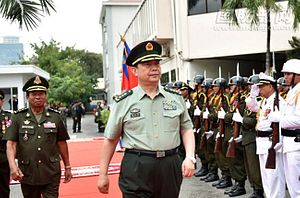On March 25, China and Cambodia inked a memorandum of understanding (MoU) on cooperation in science and technology. The MoU, valid for 3 years, will see the Chinese side train Cambodian officials in science, technology and innovation.
The MoU was publicized by both sides as an injection of human capital investment to address skill shortage and lack of technology, factors cited as impediments to economic growth in Cambodia. This increased productivity would also indirectly benefit hundreds of Chinese companies in Cambodia facing a dearth of skilled workers.
The agreement is the latest development in a steadily growing Sino-Cambodian bilateral relationship. Annual growth of trade in goods between 2010-2014 was 21 percent, according to statistics from the International Trade Center. China is consistently the largest investor in Cambodia as 2011-2015 figures show, adding a cumulative investment of $4.92 billion during that period.
The Sino-Cambodian relationship has often attracted international attention over the past few years due to its role in security developments. Most notably, in 2012, Cambodia, the ASEAN chair that year, blocked the issuance a joint communiqué due to disagreements the South China Sea dispute at a ministerial meeting, the first such failure in the grouping’s history. This was widely interpreted as Cambodia bowing to Chinese pressure and a sign that Cambodia may be coming a Chinese client state. Hun Sen himself has not gotten over the incident.
But beyond influence in weakly institutionalized regional organizations like ASEAN, China also has a huge interest in the socio-economic transformation of Cambodia through trade, investment and aid. A prosperous Cambodia with closer ties to Beijing will help promote regional initiatives such as the Maritime Silk Road and the Asian Infrastructure Development Bank.
As for Cambodia, which was historically sandwiched between the Siamese kingdoms to the west and Vietnamese dynasties to the east, it has long found that its interests are best served in trying to both manage its relationships with its neighbors as well as pursue tighter alignments with other powers as well including Beijing.
More narrowly, friendship with China is also conducive to regime survival. Besides financial support, China has given substantial military equipment toward strengthening Cambodian security forces, including the national police, useful in maintaining domestic order. Diplomatic support conferred when the west isolates Hun Sen over democracy and human rights is also useful. In the aftermath of Cambodia’s July 2013 election, China was amongst the handful of countries that endorsed Hun Sen’s Cambodia People Party (CPP) victory despite opposition claims of an election plagued with irregularities. This sort of goodwill – whether symbolic, substantive or both – is the kind that Cambodia never forgets.

































